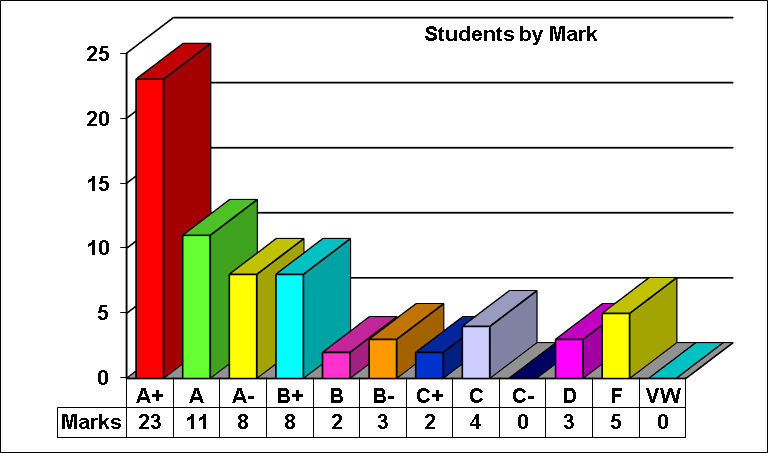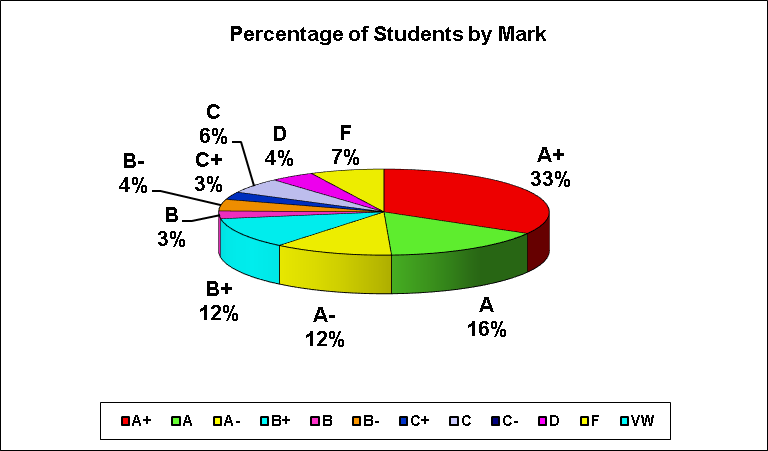DATA 301 Introduction to Data Analytics
Spring (Winter Term 2) 2016 - University of British Columbia Okanagan
Overview
DATA 301 provides an introduction to data analytics to train students with practical industrial techniques for data manipulation, analysis, reporting, and visualization. This was the first course offering. Industrial skills covered include Excel, Excel VBA, databases and SQL, Linux command line, programming/scripting with Python, data analysis with R, GIS, and data visualization including using Tableau.
On-line Resources
Student Performance
Of the 70 registered students who started the course, 64 got a D or above. The average GPA was 2.99. Charts showing the mark breakdown are below.


Comments
This class was very well received for its first offering (instructor rating: 4.9). The labs are very practical hands-on, and many students found Excel valuable. Class time is spent doing clicker questions and practice questions on the computer as much as possible. Students in many disciplines (business, arts, science) were able to learn the content even with highly variable backgrounds in computers.
Strengths of the Course
- "Very interesting material! Wish there were more data science courses. Class time well used. Labs were A LOT OF FUN!"
- "This is an EXCELLENT course! Ramon did an awesome job getting everyone excited about data analysis and now I am considering changing my minor from math to data. The hands on teaching style and accessibility to those who are NOT comp sci students were some of the things that were particularly great about the course."
- "This course was amazing. It was so interesting and well taught. The labs were very useful and realistic of typical data analysis work. Dr. Lawrence was an awesome instructor. He had well laid out notes; his instructions were clear. He went through a lot of material in depth and really fast but his notes were so thorough that you could learn the material just based on his notes. He also gave you time in class to practice questions and helped guide you through the problems. He did an amazing job. This class was so well designed that it is very hard to believe it was the first time it was ever run. The material was so broadly applicable that I think this may be one of the most important classes of my degree. It gave me good skills and I have a great base level of knowledge to grow from. Excellent class."
- "I really liked using our computers in class for practice questions. I think it made learning the material a lot easier. I really liked that you used relevant data sets and didn't just make up random numbers."
- "Fantastic course overall. Really good intro to coding and computer science in general, especially for upper year students with no coding background. Ramon is an awesome professor and clicker questions really helped to pay attention in lecture and made the labs much easier to complete. The labs were extremely helpful at practicing the skills we learnt in lecture and were the major key to success in the course."
Weakness of the Course
- "Very difficult uptake after the excel material in week 2. Too much programming too quickly for myself but I'm not from computer science. I'm in Arts so my opinion may be the outlier."
- "Some of the python labs were very hard. Maybe a little too hard. The second python lab was a large step up and it was frustratingly difficult for a first time programmer. The GIS lab was so brief, basic and unrelated to the rest of the material that I am not sure it is suited for this class. I would have preferred to learn more in R, specifically to do almost the same amount in R as in python. The R portion of the class was not what I expected. Instead of doing data management and learning how to work with data in R, it was basically an introduction to stats in R. I think its great to learn that but learning a broader range of things in R would be more useful. Stats was too much of a focus, especially in hypothesis testing. The lab questions were marked heavily on what the null and alternative hypothesis were followed by conclusions. This wasn't testing our knowledge of how to use R, it's testing our knowledge of stats."
- "This class seemed very split so that people outside comp sci found it challenging but fair, while people in comp sci found it very easy. I could caution against making the course too much harder so that it's no longer an entry level computer course."
Most Enjoyable Part of the Course
- "Learning the different ways of manipulating data using various software and programming languages."
- "I'm amazed that I walked in with little to no coding background and how much I have been able to excel in the course and how much I have learnt in such a short period of time. I really liked that we developed a lot of different skills and [learned] how to use many tools, maybe not in as much depth for each one, but I think Ramon highlighted important tasks to be able to perform using each tool. Overall, great course and I am really glad that I got to take it."
- "I really appreciated the support from the prof. He was enthusiastic and always encouraged students, being realistic about our capabilities and the difficulty of the material. The candy as an incentive helped because we love candy, but also because I would end up quite tired at 2:30 in the afternoon and a quick sugar boost would help me stay focused in class."
- "Everything. Honestly, one of my favorite courses and I am in the Arts Faculty, with no experience of computers!"
- "Dr. Lawrence is a superstar. Best prof I have had in university. He is incredibly well organized, and this allowed him to cover a lot of interesting subject matter in a relatively short amount of time. As a computer science major, some of the content was trivially easy and effectively review, but this was obviously necessary for students coming from different backgrounds, and the course still managed to cover a lot of stuff that was new and decently challenging. My favorite part of the course was developing all of the new useful skills I have when it comes to analyzing data."
 Home Page
Home Page
 Go Back
Go Back

